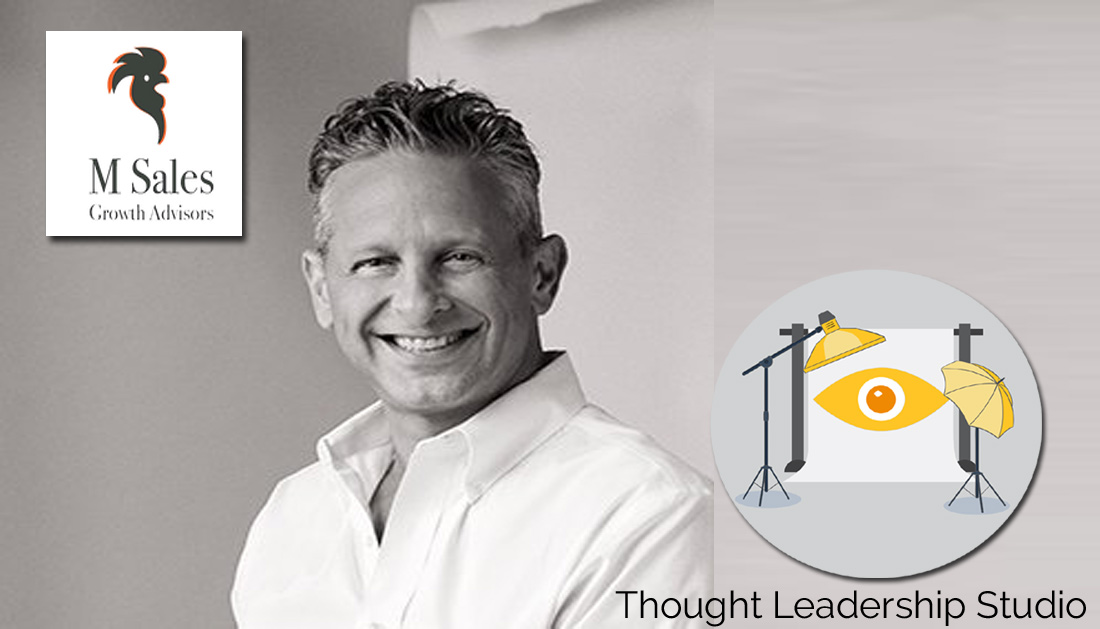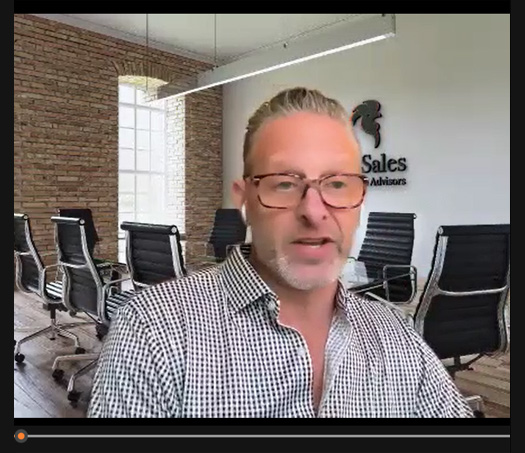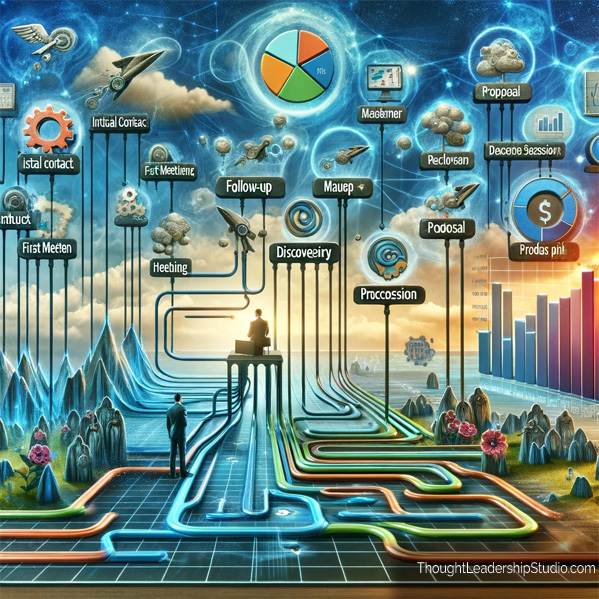Thought Leadership Studio Podcast Episodes:
Optimizing the Sales Process with Scott Moss of M Sales Growth Advisors
Episode 60- Navigating the Sales Maze with Empathy-Driven Sales Strategies

#communication, #consulting, #contentmarketing, #marketing, #marketresearch, #persuasion, #sales, #thoughtleadershipmarketing
Or Click here to listen or subscribe on appWhat this episode will do for you
:- Navigating the Sales Maze in Tech: Delve into Scott Moss' expertise in enhancing sales processes specifically tailored for the tech industry, ensuring scalable and repeatable success.
- Empathy-Driven Sales Strategies: Discover the pivotal role of empathy in understanding the buyer's journey, and how it can revolutionize your approach to sales.
- Leveraging CRM for Lead Management: Uncover the importance of using Customer Relationship Management tools for efficient management of leads and prospects.
- Converting Leads to Clients: Gain insights into developing a fluid, multi-channel process for transforming potential leads into loyal clients.
- KPI-Driven Sales Strategy: Learn how Key Performance Indicators can guide and enhance your sales team's performance, focusing on targeted goals and outcomes.
- Content Utilization in Sales: Discover how to leverage existing thought leadership content in your sales strategy to engage and convert prospects.
Scott Moss of M Sales Growth Advisors.
In this episode, I am excited to introduce Scott Moss, the founder and CEO of M Sales Growth Advisors.
Scott helps clients in the tech industry improve their sales processes and achieve scalable growth. We discuss the importance of having a defined sales mission, documenting processes, and using a CRM to manage leads and prospects.
Scott emphasizes the need for empathy and understanding the buyer's journey when developing sales strategies. He also recommends structuring your day to include dedicated time for prospecting.
All businesses rely on sales and, like everything in business, sales is a process that benefits from clear documentation and optimization. Whatever the size of your business, the processes and insights Scott brings to the table are relevant and I'm sure you will learn something that can make an immediate impact on enhancing your sales through improved processes.
Some of Scott's coordinates:
Curated Transcript of Interview with Scott Moss
The following partial transcript is lightly edited for clarity - the full interview is on audio. Click here to listen.
Chris McNeil: I'm Chris McNeil, with Thought Leadership Studio, and I am sitting here with Scott Moss, who is the founder and CEO of M Sales Growth Advisors, who helps clients primarily in the tech space improve their sales processes by leveraging sales tools. He does coaching, helps with thought leadership content, accountability to KPIs, and a defined, repeatable and scalable sales process, something that should be valuable to all of us in business. Welcome Scott.
 Scott Moss: Hi, Chris. Thanks for having me. And you nailed it. That's exactly what I do.
Scott Moss: Hi, Chris. Thanks for having me. And you nailed it. That's exactly what I do.
Chris McNeil: I had a good script to go by, so it helped a lot.
Scott Moss: Perfect.
Chris McNeil: So Scott, for our listeners, what set you on this path? What was the moment or phase in your life that you kind of woke up to your potential as a leader in sales processes and guidance?
Phoenix Rising from the Ashes in Early Days of COVID
Scott Moss: Sure. So great question. I mean, I've been in sales my entire career, so that's 30 years now. And halfway through my career, I got out of corporate sales and went to do something more entrepreneurial and got into the tech space. And those companies really were looking for process to scale lots of startups and they needed the playbook, so to speak, to guide them.
 So I worked for a couple of startups in the early part of the two thousands and all the way up through just about four or five years ago, four years ago actually. And the startup that I was with lost their funding when COVID hit. So instead of going to work for another startup doing what I had done for all those years, I thought that I should start my own business. And I thought that there was a need in that space, especially small, medium-sized firms to have something that's repeatable, something that they can count on to scale.
So I worked for a couple of startups in the early part of the two thousands and all the way up through just about four or five years ago, four years ago actually. And the startup that I was with lost their funding when COVID hit. So instead of going to work for another startup doing what I had done for all those years, I thought that I should start my own business. And I thought that there was a need in that space, especially small, medium-sized firms to have something that's repeatable, something that they can count on to scale.
So it was really something that I'd have always done. The timing with COVID kind of pushed me a little bit further and said, do it on your own. So that's what I did. I started M sales growth April 1st, 2020 and picked up my first client about two months later and haven't looked back.
Chris McNeil: That's awesome. It's also like the Phoenix rising from the COVID ashes.
Scott Moss: Right?
Chris McNeil: I can relate. A hurricane set me on the entrepreneurship path.
Scott Moss: Yeah.
Chris McNeil: And since it wiped out the city, it was like, well, might as well start something brand new. So that's awesome.
So if you had to pick a couple of key processes that you think are relevant as leverage points for people who might already be good at persuasion and large scale marketing and creating good media - which I think most of our listeners probably are - but need to convert this attention to sales, what are the leverage points you look for?
Scott Moss: So let me start with the biggest challenge that I've seen with that, if that's okay. So I've worked with many companies and been a part of companies that can acquire leads, that can create brand awareness and generate interest. The challenge then is what do you do with those interested potential clients?
Building a Fluid and Repeatable Process of Lead Conversion
So maybe that's kind of that lever point of "We have them, what do we do with them? What process do we follow to turn them from tire kickers into qualified leads into actual paying clients?"
And typically it was send an email, make a phone call and cross your fingers. And that's not something that is scalable or repeatable. So it's really a function of building some sort of fluid process. And it's not complicated, but building a fluid process and following it so that when a lead comes in, however it's acquired, it goes through a certain sequence that is aimed at converting it into an actual client.
 And that could be a multi-channel, multi-touch sequence. But the key is multi. And most companies will make a call, like I said earlier, or send an email and sit back and wait, but that's not how sales works. We wish it worked that way, but it doesn't. And for a number of reasons, it could be because timing isn't right that someone's not calling you back. It's because the pain isn't great enough that someone's not returning your email.
And that could be a multi-channel, multi-touch sequence. But the key is multi. And most companies will make a call, like I said earlier, or send an email and sit back and wait, but that's not how sales works. We wish it worked that way, but it doesn't. And for a number of reasons, it could be because timing isn't right that someone's not calling you back. It's because the pain isn't great enough that someone's not returning your email.
So it's incumbent on the sales team to kind of not force the issue but bring it to a higher state of awareness with a potential client. And that's what a sales process can do. And it's not all about making 10 and 15 calls and leaving all those messages, that's part of it. But it's about providing credibility and thought leadership and subject matter expertise so that those leads that may just be tire kickers, start to think more about what your specific organization can do to help them solve a problem or accomplish an objective. And that's where those sequences really come into play.
Chris McNeil: So you have sequential processes that aim to create a buying environment, so to speak, where a prospect can become more aware of the problem that's driving them to a solution and possible solutions that could solve that problem.
Scott Moss: And it's creating more of a pain, right? It's bringing that pain, not just how it impacts the buyer that day, but how it impacts their business for the medium. And so you can't just throw out the services that you offer or the products that you offer.
You have to dig deeper than that. I think you had someone on a couple of weeks ago that was talking about the iceberg and it made complete sense. It's like peeling back an onion. You can't just rely on the first thing you say. You can't just rely on the first question. And it's the same thing in sales and uncovering pain. You can't rely on just an email or a call. You have to get them thinking about the impact of not doing something.
And once you get them to see that, they need to then view you as the subject matter expert. So awareness, they know they have a problem, they know who you are, consideration, they're thinking about doing something about it, and they'll consider you as a possible solution provider because you have presented them with some level of expertise and then decision if they, they're ready to spend their money, you're in a position to earn that business because you have already through content, through touches, through the presentation of who you are, what you do, and the impact that you've had on businesses, you'll earn that prospect's "yes" and win.
Chris McNeil: Yes, I'm a big believer in sales processes. As we were discussing before we started recording, I've seen it work in my own businesses in the past. How much diversity is there and the range of types of processes that you bring to business.
You say you work a lot in the tech space. I imagine even within the tech space there's got to be some diversity. So the same kit wouldn't necessarily work for all of them? Or are there core things that would?
Scott Moss: So the same structure will work, but you have to nuance that structure. So we think about the sequence and maybe in one industry the sequence runs on a cadence of every three days, right? Might work for a highly transactional business where you're selling widgets or you're selling software packages.
Something that's more complex requires more space in between touches. So a little bit of a longer cadence with different messaging. And so while a structure can be applied, you have to make sure that within that structure it is specific and diverse to the unique challenges and industry specs that that company is operating within.
Chris McNeil: That makes sense. Certainly the frequency of touches pivoting on the complexity and nature. Can you give our listeners some examples of types of touches? Maybe some that involve pure media, some human touches or combination type touches, or how would you ... ?
Scott Moss: Yeah, so I mean you have to use the tools that are out there. LinkedIn is a tool for communication, and that's a great way to start a conversation as long as you're not selling the big problem that I've seen lately with LinkedIn, and I'm the recipient of a ton of LinkedIn spam people trying to sell me stuff left and right on LinkedIn. And my clients are afraid of that. And when I suggest to them that we're not going that route, we're going the route of starting a conversation and building a relationship and earning some level of trust and presenting a high level of credibility and subject matter expertise, then it's kind of like, okay, that makes sense.
Spinning the Sales Wheel at a Different Rate Depending on the Length of the Cycle
So you have to make sure that whatever tool you're using, email, phone, LinkedIn, video messaging, SMS, that you're focused, especially with the type of clients that I work with in tech, which is the more complex side of it, longer sales cycles that you're not about pitching, you can't pitch, you have to present knowledge, you have to present empathy to their situation.
 You have to show them that you've seen it, you understand it, you've helped other clients work through it. And it's really about coming up with a solution that's specific to them within the structure. So you have to use all of those tools. It's a matter of how you're using them and where you insert them in a cadence. So for example, I have one client that is a wealth management firm. So 90% of my business is in technology. The other 10% is like a mishmash of other types.
You have to show them that you've seen it, you understand it, you've helped other clients work through it. And it's really about coming up with a solution that's specific to them within the structure. So you have to use all of those tools. It's a matter of how you're using them and where you insert them in a cadence. So for example, I have one client that is a wealth management firm. So 90% of my business is in technology. The other 10% is like a mishmash of other types.
And we have to be very careful with wealth management because everybody and their brother is trying to sell stocks and bonds and mutual funds and retirement planning. And it's a very relationship driven business, but you have to start a relationship somewhere. And so we have to use the tools that are out there to start that relationship.
So again, it's creating awareness of who these wealth managers are and what makes their firm different and not driving home every third day through an email or through a phone call that they need to be considered as the wealth manager of choice. It is drawn out, it's several weeks between touches, it's very soft touches. So everything has to be nuanced, but you have to use the tools that are out there. Even those wealth managers, they're on LinkedIn and they're making connections and they're sharing messages and content, and they're also at some point going to pick up the phone and reach out to the folks that have engaged with their outreach.
Chris McNeil: Seems like your approach pivots a lot on buyer psychology and empathy and the stages of learning people go through before they refine their criteria enough to feel comfortable making a purchase.
Scott Moss: Yeah it relies heavily on that.
Chris McNeil: Do you help companies build a psychological profile of this learning that prospects go through ahead of the sale?
Scott Moss: I actually do, yeah. So part of, I think what's really important in any process or playbook is to have a very clearly defined sales mission and a sales mission. Is the compass really for your plan and your process points you in the right direction? So the components that I consider critical are the key industry niches that a client wants to pursue within those niches.
Psychological Profiles of Buyers
The ideal client profile within the ideal client profile, the buyer personas and part of creating those buyer personas are defining psychological descriptors of those buyers and how they make decisions and the sensitivities that you need to keep in mind when you are pursuing them. So we go to pretty great depths when we're building out that sales mission so that when we get to a point of drafting the value proposition statements, we know that they will be meaningful to that buyer based on that psychological breakdown that we create.
 So they'll be meaningful, they'll resonate, they'll substantiate the client's offering to that buyer, and they'll have some mode, some message about differentiation as well. And the final leg of the sales mission is having really clearly defined KPIs that a sales team should be accountable for and driving new business acquisition. So those are the five elements, but to your point earlier, the psychological focus on the buyer persona within the ICP plays a big role.
So they'll be meaningful, they'll resonate, they'll substantiate the client's offering to that buyer, and they'll have some mode, some message about differentiation as well. And the final leg of the sales mission is having really clearly defined KPIs that a sales team should be accountable for and driving new business acquisition. So those are the five elements, but to your point earlier, the psychological focus on the buyer persona within the ICP plays a big role.
And you said it earlier, the ability to empathize with the decision-making process, not just, is this good for me, the buyer, is the decision smart for my business? And what impact will it have? Then it's up to the salesperson to know that and then present the solution in a way that's meaningful and impactful, not just to that buyer, but to their business, to their challenges, to their goals, all of the things that comprise the criteria that goes into their decision making process.
Chris McNeil: You reminded me of one of those statements that was pivotal for me from a guy named Jay Abraham. It was one of my influences and sales and marketing. They said that a big mistake a lot of business leaders make is they fall in love with their business where they really should be falling in love with a prospect and customer and going onto their side of the table.
And do you find that's common for leaders to have too much of an inside out view and not enough of an outside in view of how their business looks from the researching or post contact prospect and customer?
Scott Moss: Yep, 100%
Shifting to the Client Perspective - The Why
Chris McNeil: How do you get them to shift to that outside-in awareness, to that empathy? Buyer personas is certainly a good tool. It's widely used, but there has to be other things you do in your consultation and coaching that get people to accept the need to empathize.
Scott Moss: Yeah. So it is hard when you work with a founder, the love of their product, the love of their service, the love of the technology that they've created, and most focus on the features and benefits of that technology. And I'm pretty straightforward. I don't really hold back. There's not a lot of sugarcoating in the way I work with my clients. It's, look, if you want to actually grow your business, you have to stop thinking about how great your product is and start thinking about how much of an impact your product can have on a potential clients and think in their terms and think in their mindset and empathize with exactly the challenges that they're facing near and medium term.
Where does your product fit in all that? And it's not about the great bells and whistles that your product has. It's about the output. It's about what it actually does to impact the client's business. So I just tell them that the more you focus on just how great your product is, the less likely you are to grow your business. It's got to be all about the customer experience.
Chris McNeil: That's right. It's that famous question: "So what does that mean to me?" (said by the Customer)
Scott Moss: That's right. Yeah, you can say it's the why. You know, the what is the great product or the great service. The why is the impact that it has on the people that ultimately use the product or service.
Chris McNeil: So obviously you got a wide range of impact points by which you can help a business improve their sales. If we play what-if with a scenario - a consultancy. It's a small consultancy, say they got four or five consultants and a team of 20 that work wutg Fortune 100 companies and they do some thought leadership content and they do, you have eBooks and you built up an email list that keeps coming back from the eBooks.
But they don't really have a big process for converting those other than having a page on their site. We offer a free consultation, but we have an email list as some thousand of good prospects that are reading the material because they like it. What would be your impact points, your leverage points that you would approach refining that kind of system?
Scott Moss: Well, first of all, the content that they have, that's huge. So we do, a big part of what we do is buyer's journey content analysis, gap analysis and make sure we have enough content pieces that align with the buyer's journey. So this consultancy that you're talking about has all that. They've got a beautiful website, but it sounds like the consultants - AKA rainmakers - are probably not making rain.
Putting Together a Defined Process
So it's simple. It's really about outreach. It's about putting together a defined process, blocking time in a calendar to execute that process and being held accountable to KPIs. That is very important. And that's where I find a lot of teams, whether they have a sales team or I've even spoken with some accounting firms, some consulting firms, their consultants aren't salespeople. They don't know how to be salespeople. The wealth management client that I mentioned, they don't know how to be salespeople.
So it's a matter of putting KPIs in place that they are accountable to and showing them how to execute the process and making sure they're doing it. So that lever point is saying, look, if you actually want to grow this business, then you're going to have to do this business development work. It's not all going to come to you. So you have to think 12, 18 months out. And what are you doing to fill your pipeline with qualified leads that at that point will become clients and it takes that kind of nurturing to turn them when they are ready to be turned.
Chris McNeil: Do you find flow charting these processes is helpful?
Scott Moss: Yeah, absolutely. That's exactly how we do it.
Chris McNeil: When you're mentioning KPIs, are we talking about things like number of leads per unit time, solution presentations, or discovery presentations...?
Scott Moss: We're talking about initial touches to your target ICP. We're talking about visibility into opens and clicks and engagements With those initial touches. We measure secondary outreach. Who are you following up with? Who are you connecting with that has shown some level of interest?
 And then it's how many first time meetings have you had those intro discussions and how many do you need to have in a given month to get to X number of discovery sessions and how many discovery sessions do you need to have to get to X number, X number of proposal pitches? And that ultimately drives you to the client acquisition goal that you need to achieve.
And then it's how many first time meetings have you had those intro discussions and how many do you need to have in a given month to get to X number of discovery sessions and how many discovery sessions do you need to have to get to X number, X number of proposal pitches? And that ultimately drives you to the client acquisition goal that you need to achieve.
Chris McNeil: So you're beginning with the end in mind, we want this many clients, so we need to do this many presentations and we need to do this many discoveries ... ?
Scott Moss: Right? Everything is kind of reverse engineered. So we either look at it as what is your total either contract value goal or total realized revenue goal? And we look at average ICP size and spend and back out numbers based on what we've seen as kind of industry standard conversion rates from one stage of the client lifecycle to the next.
Chris McNeil: And do you hone in on optimization of these, especially the in-person type touchpoints with training designed to increase the conversion ratio type KPIs so that you're giving the optimum presentation? Or do you do a lot of AB testing with this? Do you have companies test different approaches against each other?
***************************************
The transcript is lightly edited for clarity and is a partial transcript- the full interview is on audio. Click here to listen.
***************************************
Free Stuff and Offers Mentioned in Podcast
***************************************
***************************************